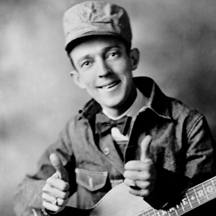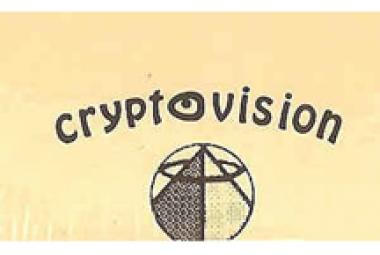Jimmie Rodgers (September 8, 1897 – May 26, 1933) was an American country singer in the early 20th century, known most widely for his rhythmic yodeling. Among the first country music superstars and pioneers, Rodgers was also known as “The Singing Brakeman”, “The Blue Yodeler”, and “The Father of Country Music”. (More from Wikipedia)
An amped-up version of a song by the country & western foundational musician Jimmie Rodgers (“The Singing Brakeman”, not the Jimmie Rodgers who recorded “Honeycomb”) was the most popular song by the Fendermen. The song is called “Mule Skinner Blues” (originally named “Blue Yodel #8”), and they were convinced to record the song with just the two of them, with no bass guitarist or drummer. The vocals are little more than a grumble; what really comes through are the gleeful laughs. Though the song was all rock and roll to me, I used to hear this version of “Mule Skinner Blues” occasionally on country music radio stations also. Unaccountably, the performance became a hit and made the Top Ten.
“Mule Skinner Blues” has been recorded by many others over the years, notably by Dolly Parton; when she states flatly mid-song “I want to be a mule skinner”, you can almost believe her.
(December 2014)
* * *
I was also able to tour the Country Music Hall of Fame Museum, where I learned about the disparate forces leading to what is known as country music: rockabilly from Elvis Presley on down (my favorite form of country and, by now, maybe my favorite form of rock and roll as well), yodeling masters (particularly Jimmie Rodgers, whose 1927 hit “Blue Yodel No. 1 (T for Texas)” was the first half-million–selling country song), honky tonk (the kind of music heard in early country music clubs, as personified by Hank Williams Sr.), mountain folk music (most importantly the Carter Family), Western music (often in the form of singing cowboys like Gene Autry and Roy Rogers – in fact, for many years the genre was called country and western), and Western swing (basically countrified big-band sounds). I don’t know too much about the latter strand, and Jimmie Rodgers is a bit old-fashioned for my tastes (though I have a compilation CD that I sure hope turns up among those remaining to be cleaned up from Katrina); but I have learned enough about the other foundational musicians over the years and other early forms of country to become a major fan.
* * *

Like rock and roll, country music presented older music in new forms in the early days, though most of the material was new songs – or at least new to their audiences. Hank Williams and Jimmie Rodgers (“The Singing Brakeman”) among others are legendary songwriters as well as performers. Another early country-music legend Roy Acuff is also renowned as the founder in 1942, with Fred Rose (a talent scout and major music-industry figure), of Acuff-Rose Music; as described in Wikipedia: “Acuff-Rose’s honest behavior towards their writers set them apart from other music publishing firms at the time and led them to fame throughout the 50’s, 60’s, and 70’s.”
* * *
The entry on the Carter Family in Allmusic (by David Vinopal) begins: “The most influential group in country music history, the Carter Family switched the emphasis from hillbilly instrumentals to vocals, made scores of their songs part of the standard country music canon, and made a style of guitar playing, ‘Carter picking’, the dominant technique for decades. Along with Jimmie Rodgers, the Carter Family were among the first country music stars.”
(February 2015)















